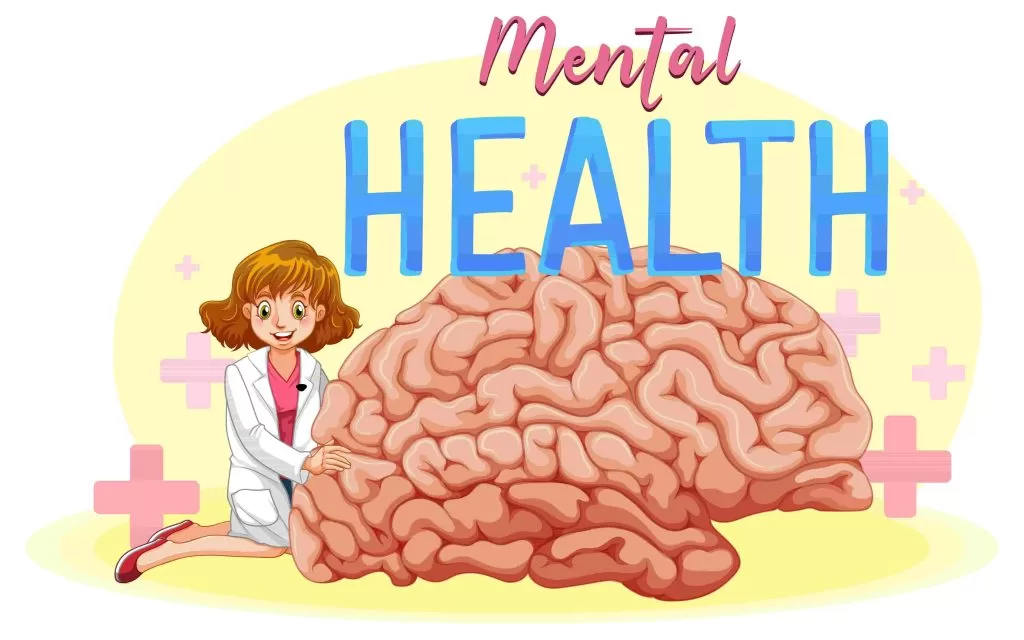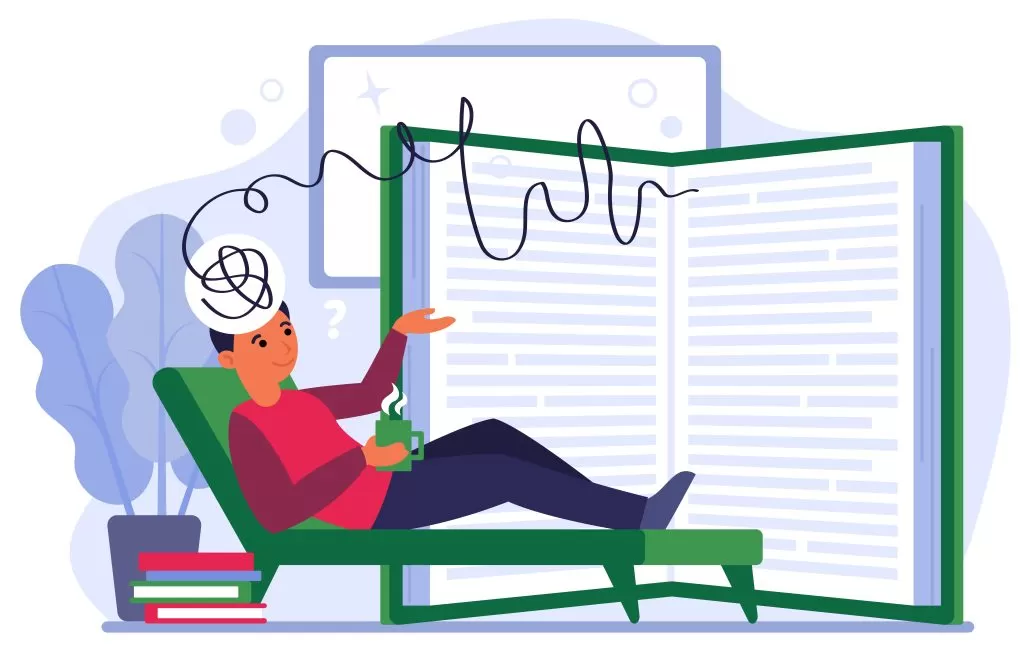It’s no secret that reading can be a relaxing and entertaining activity, but there are lots of mental health benefits of reading. Reading may be an easy and fun method to enhance your general well-being, from lowering stress and anxiety to enhancing mood and sleep. Reading may help people feel less stressed and anxious, which is one of the most important advantages for mental health.
You may take a break from your everyday cares and anxieties when you get lost in a book and put your attention elsewhere. You may feel more at ease and in control after using this as a potent technique to unwind and relax. In fact, studies have shown that reading can be just as effective as meditation at reducing stress and anxiety. Reading can be a simple and enjoyable way to improve mental health and well-being.
Numerous cognitive advantages for mental health can result from reading. Reading has been demonstrated to enhance memory, focus, and critical thinking abilities, all of which can lead to greater mental health and wellbeing. Reading may help you comprehend other people’s perspectives and their ideas and feelings, which can help you be more empathic.

How Reading Can Improve Mental Health?
In a number of ways, reading can enhance mental health. As a diversion from the demands of daily life, it can, among other things, lower stress levels and encourage relaxation. By giving you the ability to comprehend and relate to the experiences of others, it may also stimulate the intellect and boost empathy. Reading also stimulates the brain and aids in the formation of new connections, which improves memory and cognitive performance.
Last but not least, reading may increase self-esteem and give people a sense of satisfaction since it enables them to learn new things and experience a sense of growth and achievement. Generally speaking, reading has the ability to elevate mood, lessen anxiety and sadness, and enhance general wellbeing. This article talks about these amazing benefits of reading for mental well-being.
Mental Health Benefits of Reading
Reading can have a number of positive effects on mental health. Some benefits of reading books for mental health include:
1. Reduces Stress and Anxiety
Reading is a tranquil and soothing hobby that may help you relax and relieve tension. Reading can help you manage your stress and anxiety. When you lose yourself in a book and focus on something else, you may be able to escape your daily concerns and fears. This may be an effective method for relaxing, putting you at peace, and helping you feel more in charge.
In fact, studies have shown that reading may help people feel less stressed and anxious just as well as meditating. According to one research, reading for only six minutes a day can lower stress levels by 68%. Another study discovered that reading helped those with anxiety disorders experience less anxiety and depressive symptoms.

There are a number of reasons why reading might help you feel less anxious and stressed. One benefit is that reading can aid in relaxation and stress relief, which is beneficial if you read before bed. Reading can also help you feel more calm and focused by offering a feeling of escape and diversion from your everyday worries.
Furthermore, reading may be a kind of self-care since it gives you a chance to relax and concentrate on something interesting and pleasurable. You may feel more in control of your thoughts and feelings as a result, which may make it easier for you to manage stress and anxiety.
2. Improves Mood
Numerous mood-enhancing effects of reading have been found. The ability to escape from daily concerns and be diverted from them is one of the key ways it might elevate mood. Reading allows us to escape into the narrative and temporarily forget our own worries. Stress, anxiety, and depression symptoms may be lessened as a result.

Reading may also lift one’s spirits by giving one a sense of purpose and achievement. A sense of pleasure and success that comes from finishing a book might improve our mood and self-worth. Reading may also aid in enlarging our perspectives and deepening our comprehension of the world around us, which might result in a greater sense of purpose and meaning in life.
Reading can also improve mental stimulation and emotions of calmness and relaxation. Reading can assist to relax the mind and lessen feelings of tension and anxiety since reading requires our brain to be actively involved in the process of understanding and interpreting the material. Generally speaking, reading has the power to elevate mood through fostering feelings of escape, achievement, and relaxation. It can be an effective technique for stress management and enhancing mental wellness.
3. Promotes Self-Reflection
Reading gives us the opportunity to get fresh viewpoints and insights into our own lives and experiences, which makes it a potent instrument for encouraging self-reflection. We are able to observe the world from a new point of view and evaluate how those experiences could connect to our own life when we read about other people’s experiences, whether they be those of fictitious characters or actual individuals. This can assist us in conducting a more impartial and objective examination of our own ideas, feelings, and behaviors.

Additionally, reading can help us become more self-aware and comprehend our own feelings and motives. As we read about the inner thoughts and feelings of characters in a book, we may be able to better understand and recognize our own emotions and how they influence our behavior.
Reading also offers a chance for introspection and reflection, which can aid in the promotion of self-reflection. Reading allows us to take our time and ponder the topics and concepts in a book in more depth. This may inspire us to consider more carefully the relationships between our own values, goals, and beliefs and the world at large.
4. Strengthens Empathy
Reading gives you the chance to comprehend and empathize to other people’s experiences, which can help you develop your empathy. We are able to perceive the world through the perspective of the characters in a book and learn more about their ideas, feelings, and motives when we read about their lives and experiences. This can make us feel more a part of the community and better appreciate the challenges and hardships of others.

Reading may also aid in broadening our horizons and improving our comprehension of various groups, cultures, and lifestyles. We may understand and appreciate the variety of human experience by reading works set in many eras and locations. This can help us experience less bias and bigotry and help us understand and empathize with people more.
Reading can also aid in the development of our emotional intelligence and capacity for recognizing and comprehending the emotions of others. We could be better able to comprehend and identify our own emotions as well as those of others as we read about the emotions of characters in a novel. This can make us more perceptive to other people’s needs and feelings and attentive to them.
5. Improves Sleep
Reading has several benefits for sleep. It can accomplish this, among other things, by aiding in the relaxation of the body and mind. When we read, we are able to put aside our everyday concerns and pressures and become engrossed in the tale. This can aid in calming the body and mind and lessen emotions of tension and worry that may keep you up at night.

Reading can also help to regulate the body’s production of the hormone melatonin, which plays a key role in sleep regulation. Exposure to bright light can suppress the production of melatonin, while exposure to dim light can increase it. Reading a book under dim lighting can help to increase the production of melatonin, which can make it easier to fall asleep.
Reading can also assist control the body’s melatonin synthesis, which is important for controlling sleep. Melatonin synthesis can be suppressed by exposure to bright light and increased by exposure to low light. Melatonin synthesis may be increased by reading a book in low light, which helps facilitate falling asleep.
What to do to get the optimal mental health benefits of reading?
It’s crucial to select reading content that is interesting and entertaining if you want to get the optimal mental health benefits of reading. This will make reading more enjoyable for you and keep you motivated and engaged.
It’s also a good idea to set aside dedicated time for reading, whether it be a few minutes a day or a longer period once a week. As a result, it may be easier to make reading a regular habit, which is good for mental health.
It can be beneficial to read a variety of books, whether they are nonfiction, fiction, or anything in between. This might expose you to fresh viewpoints and help keep things interesting.
To help you unwind and thoroughly immerse yourself in the content, attempt to establish a relaxing and suitable reading atmosphere, such as a comfy chair or a silent room.
What not to do to get the optimal mental health benefits of reading?
For the best reading results in terms of mental health advantages, keep away from the following:
Don’t make yourself read anything you find boring or dull. This may cause irritation and turn reading into a duty rather than something to enjoy.
If you are feeling sleepy or distracted, avoid attempting to read for extended periods of time. This may cause irritation and lessen how much you love reading in general.
Don’t feel obligated to read a specific number of pages in a given length of time or at a certain speed. Take your time and enjoy reading; it should be a relaxing and pleasurable hobby.
Feel no need to read solely “serious” or “academic” content. Regardless of the subject or genre, it’s crucial to pick reading material that appeals to you and keeps you interested in it.
Conclusion
In conclusion, there are plenty of mental health benefits of reading. By offering a sense of escape and diversion from the stresses of daily life, as well as a sense of achievement and purpose, it can elevate mood. Through fresh perspectives and insights into our own life, as well as opportunities for introspection and reflection, reading may also encourage self-reflection.
Reading also broadens our perspectives and deepens our awareness of other cultures and groups, which all contribute to enhancing our capacity for empathy. Finally, reading can promote better sleep by promoting mental and physical relaxation, regulating melatonin synthesis, and offering a fun and stimulating method to unwind before bed. As a whole, reading may be a powerful tool for managing stress and improving mental health.
In general, reading may be a fun and easy approach to enhance one’s mental health and wellbeing. Reading may be a terrific method to enhance your mental health, whether you’re trying to lower stress, increase mood, or just want to temporarily escape into another world.

